"They already organize festivals for techies!": the reality and myths of life in Turkey
How to rent an apartment in Turkey? How much are oranges? Is there a well-developed IT community already? On the eve of the event, PMCLUB founders Dmitry and Valeria Ilyenkovy gave details on life in Antalya exclusively for the Anywhere Club blog.

ABOUT PREPARING FOR RELOCATION
— We moved in last September. What provoked it? As is usually the case, several aspects led to this decision at once. Firstly, I had always wanted to try living abroad — such an exciting experience. Secondly, the Moscow climate was not very good. The atmosphere's thickening around me also had an impact. I felt it was time to leave as if it could be "too late." A few years ago, I read Pasternak's novel Doctor Zhivago, and ever since then, I have not let go of the fear that I would not have time to leave, - says Dmitry.
— It took us two years to think about it and make plans. With the pandemic, we traveled much less and were forced to pay more attention to what surrounded us. We used to love our apartment in Moscow: it was in a great neighborhood, we loved strolling in the nearest park, we thought everything was great and couldn't get any better. But after the pandemic, we became pretty tired and started noticing flaws everywhere: it annoyed us that the entrance hall was poorly cleaned, and the winds blowing from Leningradka were everything but the sea breeze, Valeria adds.
In this atmosphere, we kept our eyes open and collected options of where we could go, preferably without a visa and with a cat. Three months before the departure, we began to prepare more actively. Prepare our cat, to be more exact. And give out things. We have accumulated an incredible amount of stuff in the 3 or 4 years that we lived in this apartment. We took boxes out into the entryway every day; people took them, we brought new ones, and it repeated daily. We gave a lot of things to children, our parents, and acquaintances. I remember this mysterious process: we took and took something out, but things wouldn't end.
Lera:
— We came here with one big suitcase and a small one with the cat's stuff. And backpacks with a carrier. Still, it turned out that there was no need to take some things, such as clothes. They are way cheaper here.
Dima:
— The overall conclusion is this: don't take anything with you to Turkey - except your electronic equipment.
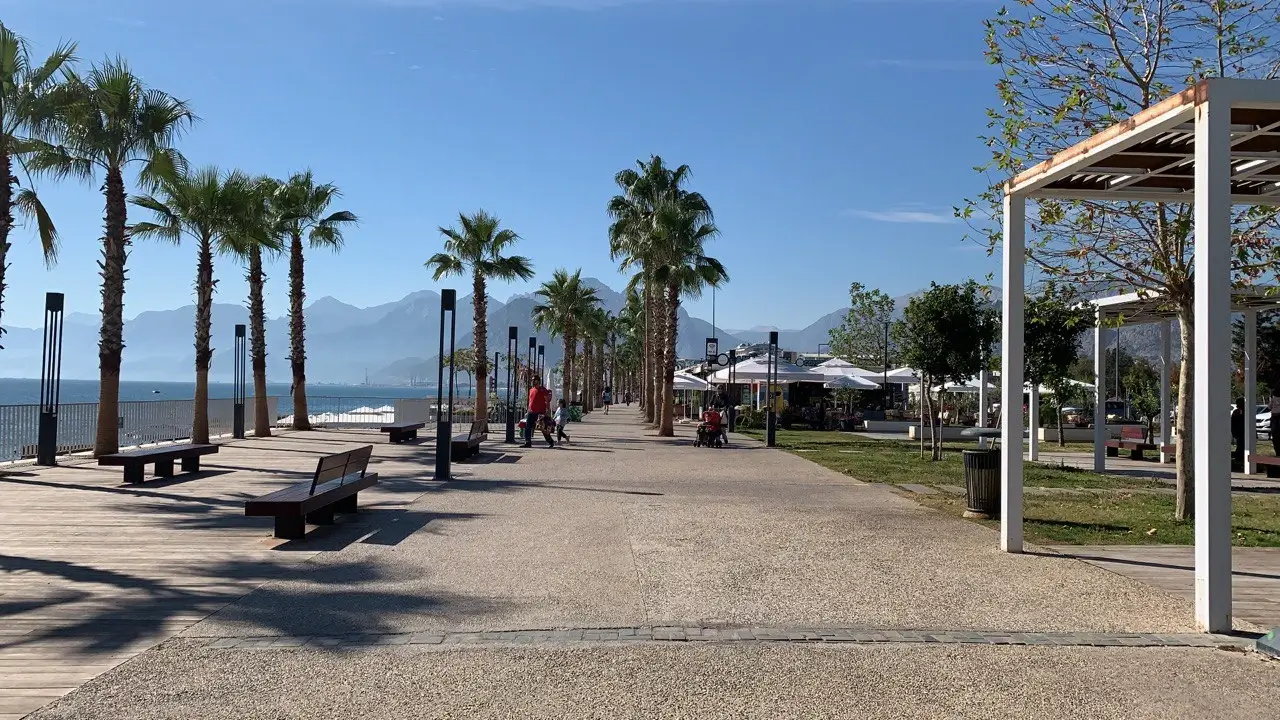
WHY TURKEY?
Dima:
— We came to Turkey by the method of elimination. We wanted safety and to live near the sea. We rejected faraway and exotic countries. We thought about Europe, but we understood that we would be stuck there for a couple of years until we obtained a residence permit. Plus, there are high taxes; it was a deterrent. We thought of the Balkans, too, but the discussion went this way: Serbia has no sea, and Montenegro is too tiny. Transcaucasia did not work out either: Tbilisi is a great city, but it is not on the sea. Batumi has the sea, but it's not Tbilisi. That's how we ended up here.
Lera:
— At that time, you could obtain a residence permit in Turkey quite quickly. So we thought that first, we would try to live here, and if we changed our minds, we would move on.
Dima:
— We bought the tickets a week before departure and rented an apartment hotel just the day before. What did we get as a result? Antalya has a fantastic climate. It can be burning in summer, but it is incredible the rest of the year. Antalya is a million-person city with a population of 1.5 million people in winter. - it's a metropolis with everything you could want from it. Antalya is a European city - it was a wow fact for us. And the prices at the time we arrived were lower than in Moscow
ABOUT RENTING
Lera:
— We arrived, checked into a hotel, and started monitoring the local long-term rental website sahibinden.com. The next day we saw an ad for a gorgeous apartment: it had a 3D tour as though from an architectural render. We called and came to see it: and it was the same as in this 3D tour, with a new renovation, leased for the first time. We settled immediately. And then the agent told us: you have to pay the first month's deposit plus two extra deposits, plus the realtor's commission. But we had already paid for the hotel for two more weeks.
Dima:
— Actually, we caught ourselves not trusting people. We offered to pay one deposit and the rest on the day of check-in. But he disagreed, so we parted. In the evening, I called the agent again: I thanked him for his work, said that I would be happy to work with him again (he owns a family business), and added that if the owner changed his mind, we would be pleased to meet again... It seems that the communication magic worked, and the next day we signed a contract.
You really can understand apartment owners: they're scared, too. Many people from the CIS countries suddenly arrive and want to rent an apartment. You have no idea what they are doing at their computers, where they get their money from, whether they will leave in two months. Turkish law declares that the tenant is always right. Even if you stop paying the rent, they'll evict you through the court only next year. Letting tenants into the house is a significant risk for landlords: they must ensure that renters are reasonable people and will pay.
HOUSING PRICES
Dima:
— We rented an apartment in a nice quiet area for 400 euros: it has a bedroom, living room, guest room, kitchen, and a large balcony. The distance to the sea is 50 meters. But now there are no such prices.
Lera:
— Everything changed a lot after the war started: a considerable flow of people; prices for apartments rose unrealistically. What was rented for 200 euros before now costs about 1000 euros. There are very few apartments, and people complain that it's hard to find a place to live.
Dima:
— Our acquaintances recently visited us, and now they rent an empty, not furnished apartment an hour by bus from the sea for 500 euros. Our apartment probably costs three times as much now.
Lera:
— At the same time, many places require payment for a year or six months in advance. In general, the situation has changed dramatically.
FOOD AND RESTAURANTS PRICES
— In the last year, things got more expensive, but the prices are still fair. For example, milk costs 1 euro per liter, and you could find it even cheaper. Fruit depends on the season. In autumn, oranges, lemons, tangerines, and pomegranates grow in the street; they cost a penny, roughly 30 euro cents per kilo of tangerines. But even now, a kilo of oranges costs 50 euro cents in the supermarket and even less at the market.
Lera:
— The dinner in a Turkish restaurant costs 200 lire; it could be more inexpensive. Meat/fish, salad, tea - 150-200 lire, which means you pay within 15 euros for two. A kebab costs 4 euros. The soup is 2 euros. Tea - 30-50 cents. Going to a more European place will be twice as expensive, around 30 Euros.
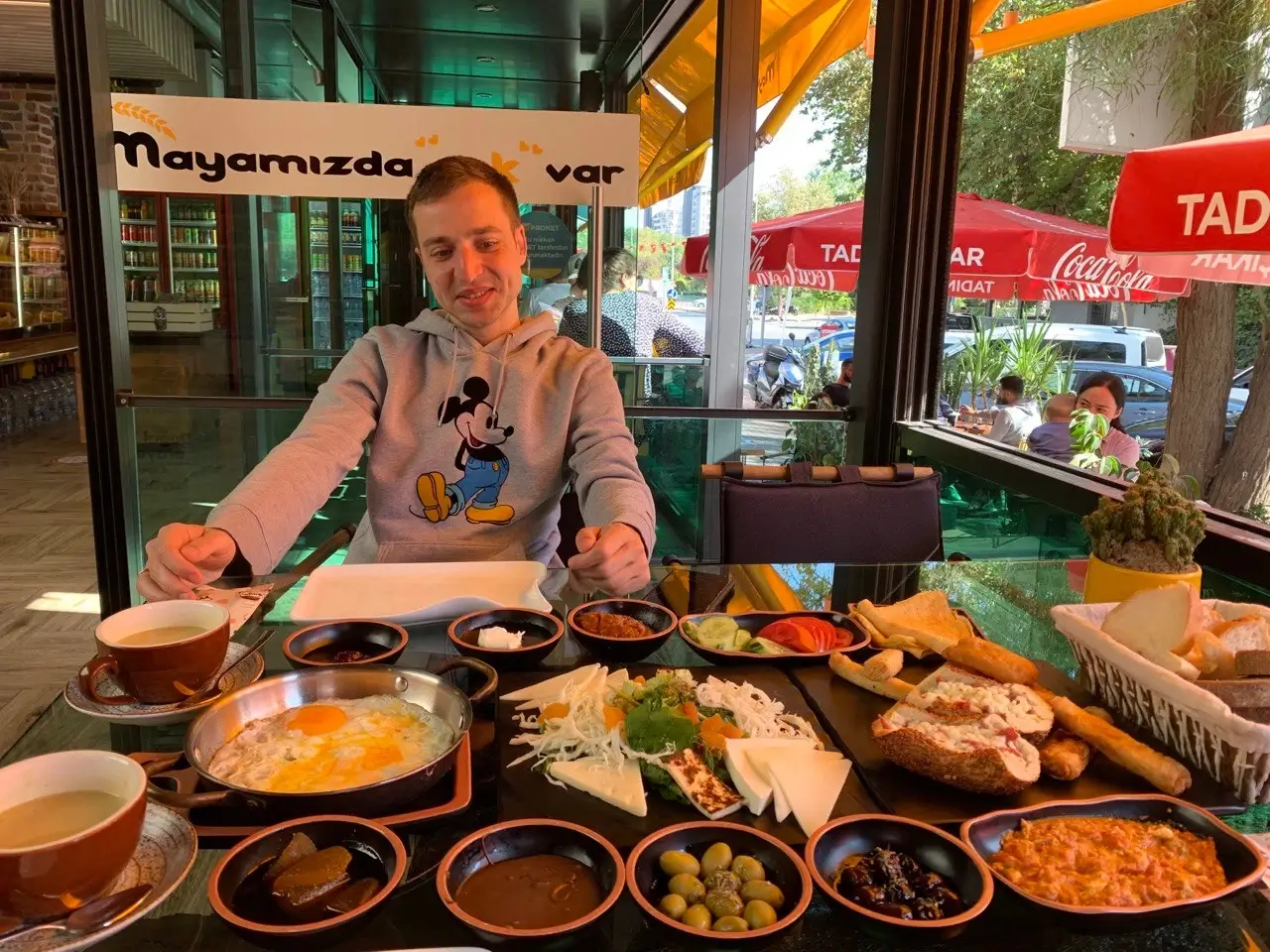
Dima:
— Yesterday I tried paella, it cost 120 lire. That's about 9 euros. A fine plate of paella with seafood. But it's expensive by local standards as it was in a pricey restaurant and with expensive cars at the entrance. Then dessert, several teas, two coffees, gin, and one more with whiskey - all reached 40 euros.
BE PREPARED
Dima:
— All the "electronics" here will be more expensive. And the car will be 2-3 times more expensive.
Lera:
— You can't bring your phone into the country, put a Turkish SIM card in it, and think you've fooled everybody. To make your phone work here, you have to register it within 120 days and pay the tax: somewhere around 200 euros now. It's better to be ready to buy a phone for a local sim already in Turkey.
LEISURE
Lera:
— In terms of travel, it's excellent here, especially if you drive a car.
Dima:
— You can rent a car. And it's considered expensive - and it's costly in the summer. But in winter, you can communicate, bargain, and look for options.
Lera:
— The most incredible thing is finding Turkish friends and traveling with them. There are a lot of waterfalls, ancient cities, and canyons - everything is stunning. You can easily find something historical and enjoy nature. There is even the Lycian Way nearby.
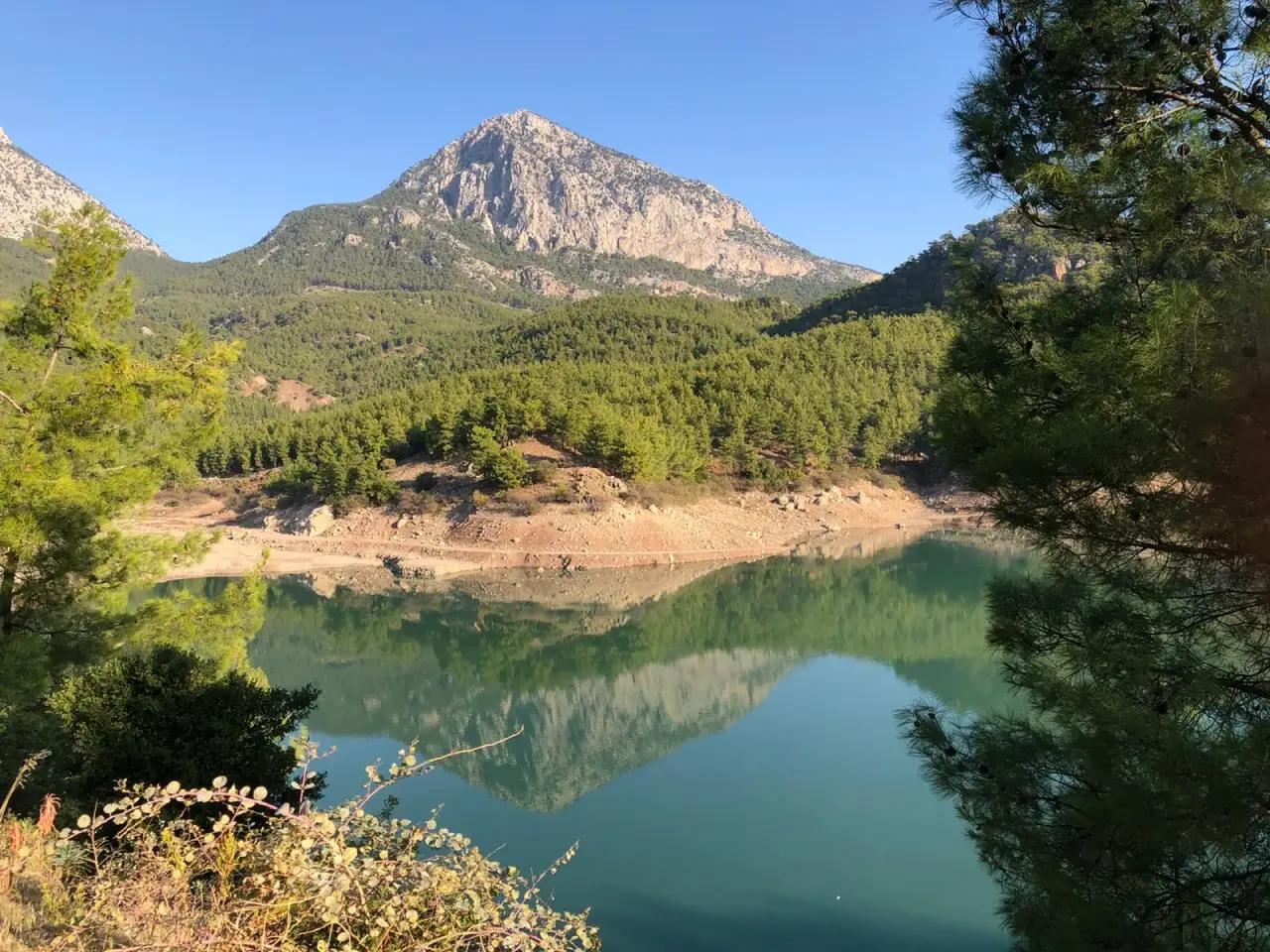
Our friend from Belgium drove to the ski resort, and it took 20 minutes by car to get there.
Dima:
— You always have places in Turkey to discover. I got to the airport and flew to Cappadocia, Izmir. In the Eastern part, there are a lot of exciting cities, which are very different from what we see here. There are no problems here when speaking about leisure and travel.
STEREOTYPES
Dima:
— We had a stereotype that Turkey is a religious country. Yes, there are a lot of mosques, and they call for prayer five times a day. But Antalya, Izmir, and other cities along the coast are more secular. Everyone wears shorts and tops. Also, many people think that dogs are not ok here because other Muslim countries have a tricky attitude towards them. We had a workout on the boardwalk yesterday, and a big dog just laid down on my mat. I was petting her, and she was playing. There are a lot of street dogs here, and they are groomed, but some are obese. Most are vaccinated.
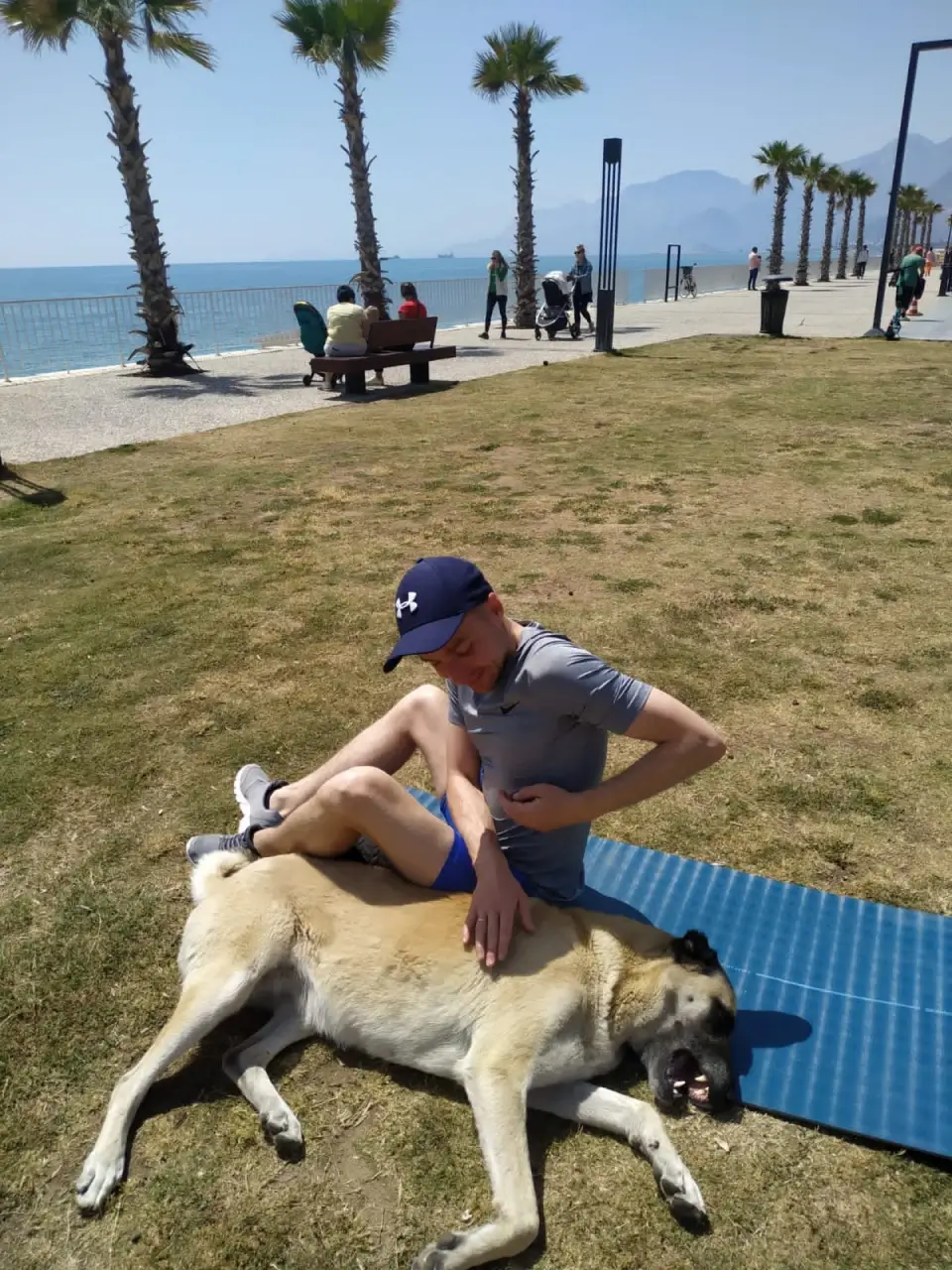
Lera:
— We thought we would arrive and everyone would start scamming us for money. The first month, we were on high alert: double-checked receipts in cafes and the store's change. It took us time to relax and get used to the fact that if people invite you for tea, ask how you are doing, or smile, they do it sincerely. When we moved in, the neighbors started bringing goodies. Some people brought a pie; some people brought dolma. We couldn't understand: what's going on, how to behave? It was shocking - we had never encountered anything like this in Russia.
We asked a local friend what kind of phone to buy to get a local SIM card, and he brought us two old iPhones that same evening: just like that. That's the proper behavior for Turks.
The realtor arranged the Internet for us. We say: how can we repay you? He answered: what do you mean by that? You already said, "thank you."
THE INTERNET
Lera:
— If you don't have a residence permit, you can't provide the Internet by yourself - you need a Turk to help you. Not everyone knows about this, and it is a shock to many people. The second point is that not all houses have average Internet speeds. In our house, it is slow: 25 Mpbs on the download. In some places, it's better, but sometimes it's worse. And this is an essential point for IT professionals, especially those who work with serious software: I don't know how they survive. I guess it's possible to do something with it.

COMMUNITY
— People start joining relocation groups even before they arrive. A friend of ours created the "Moving to Turkey" chat room on Telegram, and now she has over 11,000 followers. It's full of essentials: what to expect, what documents to take, how to move. Communities of interest started to form from this chat: someone found a company to discuss crypto, someone went to a bar. IT experts also created a separate community. But frankly, it's all just forming now. Even two years ago, there were not as many IT specialists as now. Many arrived recently, and naturally, communities began to form. There are a lot of telegram chats: dedicated purely to IT and other things - but also filled with techies. Tomorrow we're going on a picnic with Belarusians, mostly from IT - our mutual friends have invited us. Life is in full swing!
The other day we learned that there was a lecture hall for digital nomads - in a cafe where we previously gathered with another community. The IT community is growing right before our eyes. We have friends in Alanya, and when we visited them back in winter, they said: everything is fantastic but boring, we have only three IT families here. Now they sent me a link to a chat room - and some festival for IT people is already being prepared. Music, networking, everything. Although three months ago there was nothing at all. I know that EPAM brought many people to Turkey; a friend of ours moved to Izmir from Moscow.
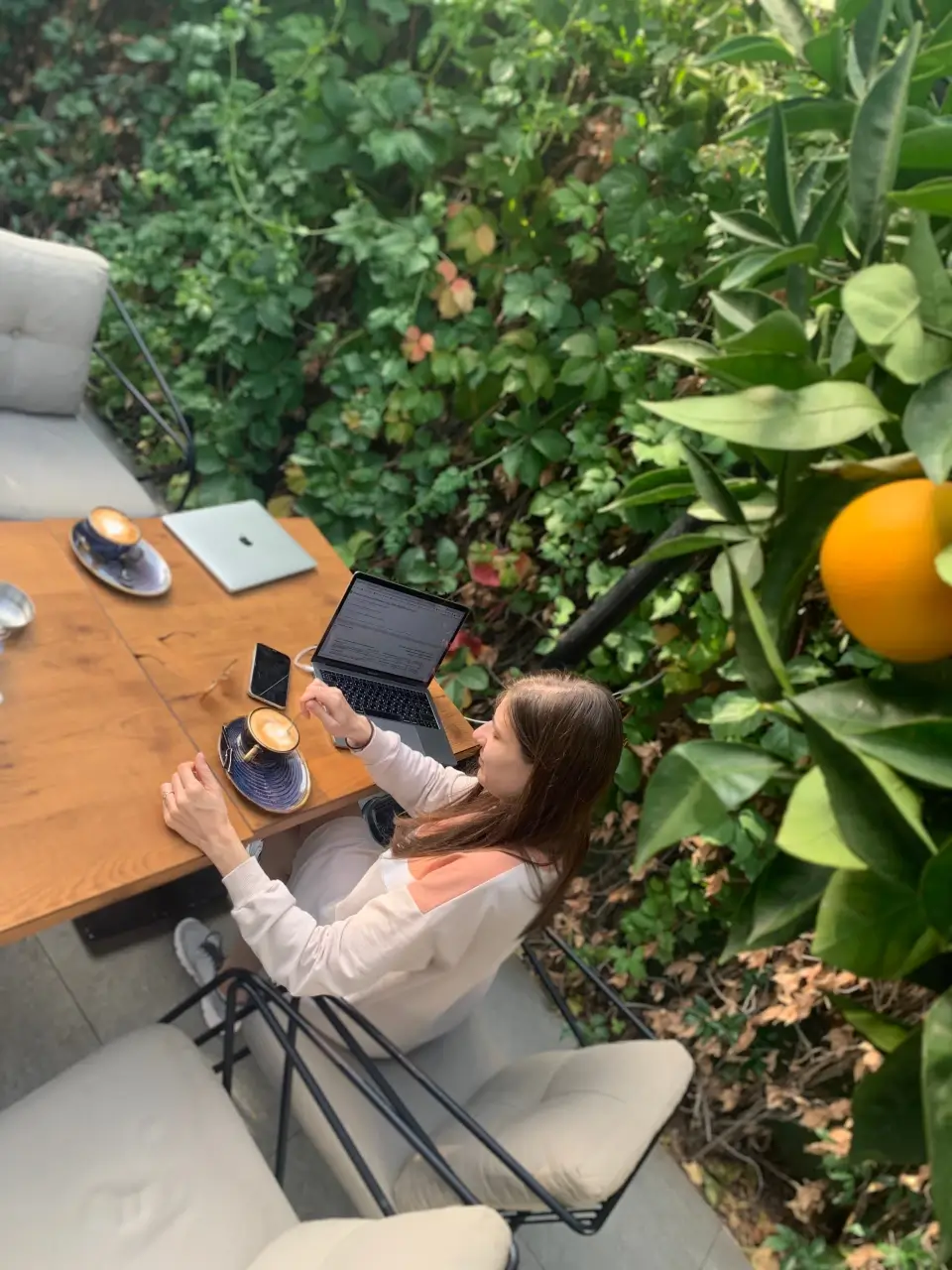
Important advice - do not get stuck in the Russian community, no matter how much you like it. It would help if you made local friends. They can explain how everything works, dispel your fears, and show you the best places.

.png)
